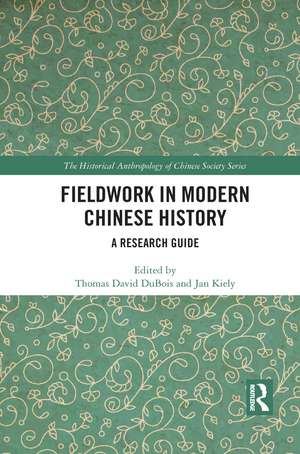Fieldwork in Modern Chinese History: A Research Guide: The Historical Anthropology of Chinese Society Series
Editat de Thomas David DuBois, Jan Kielyen Limba Engleză Paperback – 30 iun 2021
| Toate formatele și edițiile | Preț | Express |
|---|---|---|
| Paperback (1) | 390.25 lei 6-8 săpt. | |
| Taylor & Francis – 30 iun 2021 | 390.25 lei 6-8 săpt. | |
| Hardback (1) | 822.76 lei 6-8 săpt. | |
| Taylor & Francis – 21 noi 2019 | 822.76 lei 6-8 săpt. |
Preț: 390.25 lei
Nou
Puncte Express: 585
Preț estimativ în valută:
74.68€ • 77.04$ • 62.32£
74.68€ • 77.04$ • 62.32£
Carte tipărită la comandă
Livrare economică 26 martie-09 aprilie
Preluare comenzi: 021 569.72.76
Specificații
ISBN-13: 9781032085388
ISBN-10: 103208538X
Pagini: 332
Ilustrații: 6 Illustrations, black and white
Dimensiuni: 156 x 234 x 18 mm
Greutate: 0.47 kg
Ediția:1
Editura: Taylor & Francis
Colecția Routledge
Seria The Historical Anthropology of Chinese Society Series
Locul publicării:Oxford, United Kingdom
ISBN-10: 103208538X
Pagini: 332
Ilustrații: 6 Illustrations, black and white
Dimensiuni: 156 x 234 x 18 mm
Greutate: 0.47 kg
Ediția:1
Editura: Taylor & Francis
Colecția Routledge
Seria The Historical Anthropology of Chinese Society Series
Locul publicării:Oxford, United Kingdom
Notă biografică
Thomas David DuBois is Professor of Humanities at Beijing Normal University.
Jan Kiely is Professor and Associate Director of the Centre for China Studies and Associate Director of the Universities Service Centre for China Studies, The Chinese University of Hong Kong.
Cuprins
Editors’ preface: Fieldwork in Modern Chinese History Thomas DuBois and Jan Kiely I: History and fieldwork in historical perspective 1. They went to the people but did they hear them? Comments on Field Research in China the 1920s and 1930s David Faure 2. A brief history of Japanese field research on China Linda Grove 3. The Traditionalist Phase in Taiwan Anthropology: 1960-80 Myron L. Cohen II : Work reflections: Fieldwork in the mirror 4. Fieldwork for Ming historians Michael Szonyi 5. Conducting fieldwork as a local: Perspectives from Hulunbuir Guan Yuxia and Zhang Wei 6. Who Are They, and Who Am I?: Discovering Gender and Ethnicity in the Sino-Tibetan Borderland Xiaofei Kang 7. Ritual performance in changing local society Stephen Jones 8. Beyond the border of disciplines and societies: From fieldwork among the Lahu to the history of bazi basins Jianxiong Ma III : Walking the ground, talking to people 9. Basic Questions for Fieldwork on Pre-1949 Chinese Society John Lagerwey 10. Festivals in the Field--A Social Historical Perspective Paul R. Katz 11. Doing historical-anthropological fieldwork in Jiangnan: gazetteers, newspapers, and real life Vincent Goossaert 12. Incorporating historical GIS in fieldwork on Chinese culture and religion Kenneth Dean 13. Walks in Canton: Doing Historical Anthropology in a Chinese City May Bo Ching and Zhiwei Liu 14. Contextualizing Ethnic Classification: The Case of hemu (??) among the Li of Hainan Xi He 15. Mud on Your Boots: Researching the Social and Environmental History of Conservation in Baishui County, Shaanxi during the 1950s Micah S. Muscolino 16. Medicine, health and disease: Among the barefoot doctors of Hangzhou Xiaoping Fang 17. Discovering the Cultural Revolution through oral history Guoqiang Dong 18. Walking a production chain: An interdisciplinary approach to the history of things Thomas David DuBois IV. Finding and working with grassroots documents 19. Field research using contracts (qiyue): Legal archives of late Qing and early Republican-era Longquan, Zhejiang Zhengzhen Du 20. Account books (zhangben) in local history studies Yonghua Liu 21. Land and property deeds and urban studies: A case study of deeds collected by Ms. Liu, Sujuan Huang 22. Genealogies and Revolution in the Jiangxi Soviet Weixin Rao 23. Using local and Public Security Bureau archives from the 1950s—Poyang county, Jiangxi, Shigu Liu 24. Exploring a northern Jiangsu County Intangible Cultural Heritage Archive Jan Kiely
Descriere
This book explores how fieldwork has been used to research Chinese history in the past and new ways that others might use in it the future. It introduces the previous generations of scholars who ventured out of the archive to conduct local investigations in Chinese cities, villages, farms and temples.






